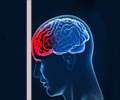Concussion is the most common type of traumatic brain injury. Brain changes seen in the first MRI scan were still present when athletes returned to play.

‘The brain is made of soft tissue. It's cushioned by spinal fluid and encased in the protective shell of the skull. When you sustain a concussion, the impact can jolt your brain.’





In a study published in Scientific Reports, researchers from St. Michael's Hospital used advanced MRI to measure brain structure and function in 27 athletes within the first week after a concussion and again after they were medically cleared to return to play. They compared those findings to a group of 27 uninjured varsity athletes. They found that brain changes seen in the first MRI scan were still present when athletes were cleared to return to play, including:
Persistent differences in the structure of the brain's white matter, the fibre tracts that allow different parts of the brain to communicate with each other
Differences in brain activity, particularly in areas associated with vision and planning, with athletes that took longer to recover also showing changes in areas of the brain associated with bodily movement
The study, done in collaboration with the David L. MacIntosh Sport Medicine Clinic at the University of Toronto, looked at male and female varsity athletes in seven different contact and non-contact sports, demonstrating the relevance of the findings for the overall sporting community, not just traditional high-risk sports such as hockey and football, according to the authors.
Advertisement
"This is the first concrete evidence we have that the brain is lagging behind in terms of recovery from a concussion," he said. "Our study shows that the neurobiological consequences of concussion may outlast the symptoms we're typically looking for when determining whether an athlete is ready to return to play."
Advertisement
"We want to emphasize that, in general, the health benefits of sport participation still outweigh the risk of concussion," said Dr. Tom Schweizer, head of the Neuroscience Research Program and a co-author of the paper. "Our findings help us to better understand how the brain changes over the course of recovery, which will in turn help to guide concussion management. The more we know about concussion, the better we can reduce potential risks."
This study received funding from Defense Research & Development Canada, the Canadian Institutes of Military and Veterans Health, the Canadian Institutes of Health Research and Siemens Canada Ltd.
Source-Eurekalert













